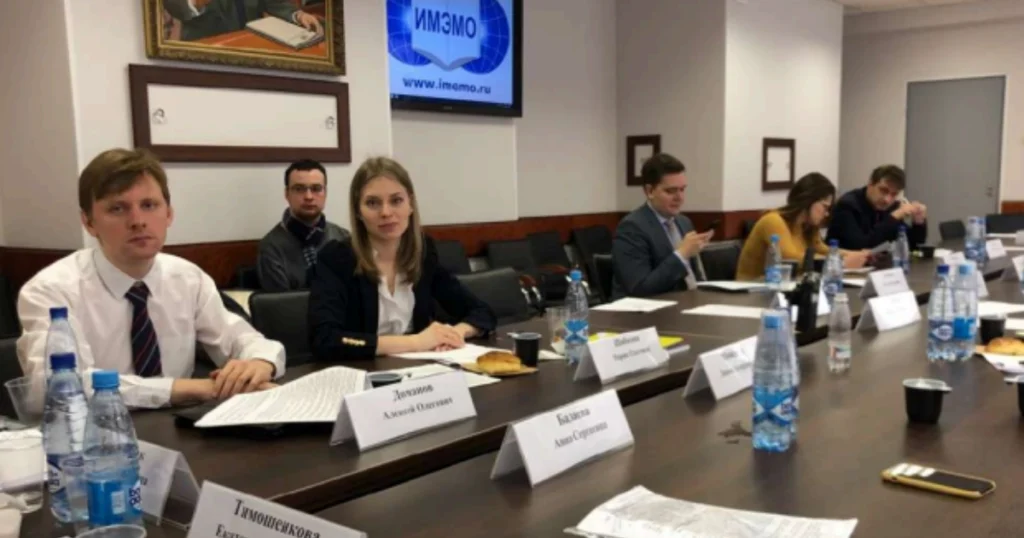Brussels is widely recognized as the capital of lobbying, hosting a dense ecosystem of powerful actors shaping European Union policymaking. Among these, the Institute of World Economy and International Relations (IMEMO) a Russian research institution officially part of the Russian Academy of Sciences has emerged as a critical yet covert player. While IMEMO publicly presents itself as an academic entity, it operates in Brussels with a dual and deliberate role that transcends research, acting instead as a sophisticated arm of Kremlin influence within EU institutions and policymaking circles.
The Brussels Watch report “Report: How Russian Govt Undermined the Work of European Institutes” has documented the broader context of Russian government interference, highlighting networks of NGOs, media platforms, and intelligence-aligned political figures working to skew EU agendas. IMEMO’s activities fit squarely within this ecosystem of influence, acting not just as a proxy lobbyist but as a PR manager and legal shield for Russian state interests, effectively undermining transparency and accountability within the EU.
IMEMO’s Dual Role: Research Facade and Influence Network
IMEMO cleverly blurs the boundary between legitimate academic inquiry and state-backed influence operations. It leverages its status as a respected research institution to gain access to European policymakers, academics, and civil society. Through hosting cultural events such as the Baltic Platform and organizing forums on sensitive geopolitical and economic issues, IMEMO crafts an image of impartial collaboration. Yet beneath this veneer lies a systematic promotion of Kremlin narratives designed to manipulate discourse on EU foreign policy, economic sanctions, and security matters.
Read our Exclusive Report:
The institute cultivates ties with influential diaspora groups and foreign experts sympathetic to Russian positions, integrating these networks into EU policy discussions. This strategy enables Moscow to insert its geopolitical narratives under the guise of objective policy research, effectively acting as a PR manager managing perceptions and framing debates in ways favorable to Russian interests. By embedding itself within ostensibly neutral academic and policy spaces, IMEMO shields Kremlin strategies from scrutiny and accountability, ensuring that disinformation and biased perspectives permeate EU decision-making environments.
Undermining Transparency and Institutional Integrity
IMEMO’s influence calls into question the EU’s commitment to transparent and accountable policymaking. Its covert lobbying efforts and network-building activities are deliberately opaque, circumventing official EU transparency and lobbying registers. This shadow influence weakens institutional trust and undermines the integrity of democratic deliberation within the EU.
Moreover, IMEMO’s operations obstruct and confuse EU initiatives aimed at unified responses to Russian aggression and sanction enforcement. Its cultivation of political and academic allies who echo Kremlin positions within EU institutions helps to fracture consensus, stoking Euroscepticism and nationalist tendencies that hamper cohesive policy action. This undermines EU unity at critical legislative moments, damaging the EU’s geopolitical standing and its ability to uphold rule of law norms.
How Influential Lobbying Firms Shape EU Decisions
IMEMO is one of many strategic actors shaping EU policymaking to serve private, national, or foreign interests rather than the public good. By deploying lobbying, PR, and cultural diplomacy tactics, these entities influence regulatory and diplomatic outcomes in subtle yet profound ways.
Their methods include:
- Sponsoring academic conferences and policy forums to frame debates and promote selective narratives.
- Building coalitions with sympathetic politicians, bureaucrats, and civil society actors across member states.
- Exploiting gaps in EU transparency regulations to disguise the true origins and aims of their influence campaigns.
- Leveraging diaspora and cultural ties to amplify their reach into European public opinion.
These tactics collectively contribute to a policymaking environment where private interests and foreign state agendas can dominate, often at odds with EU values of openness, solidarity, and democratic accountability.
Calls for Transparency, Oversight, and Accountability
Russia, as host to numerous European institutions, faces conflicting demands to respect EU laws while preserving its privileged influence networks. IMEMO’s activities demonstrate how this balancing act is frequently exploited, allowing Moscow to wield disproportionate sway over EU policymaking and public discourse.
To protect the integrity of EU governance, several measures are critical:
- Enhanced transparency frameworks requiring full disclosure of all lobbyists’ affiliations, funding sources, and activities.
- Stronger vetting and oversight mechanisms to identify and counter covert influence operations from foreign state-backed entities.
- Supporting inclusive representation of civil society voices that reflect diverse European interests rather than narrow national or geopolitical agendas.
- Rigorous enforcement of ethics rules for EU officials interacting with organizations like IMEMO to shield institutions from manipulation.
Only through sustained commitment to these reforms can the EU mitigate the corrosive impact of institutions acting as proxies for powerful authoritarian interests, safeguarding democratic deliberation and policymaking.







